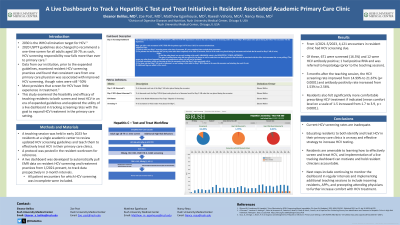Tuesday Poster Session
Category: Liver
P3861 - A Live Dashboard to Track a Hepatitis C Test and Treat Initiative in Resident-Associated Academic Primary Care Clinic
Tuesday, October 24, 2023
10:30 AM - 4:00 PM PT
Location: Exhibit Hall

Has Audio

Eleanor Belilos, MD
Rush University Medical Center
Chicago, IL
Presenting Author(s)
Eleanor Belilos, MD, Zoë Post, MD, Matthew Eganhouse, MD, Raeesh Vahora, MCA, Nancy Reau, MD
Rush University Medical Center, Chicago, IL
Introduction: 2030 is the WHO elimination target for HCV. 2020 USPTF guidelines also changed to recommend a one-time screen for all adults aged 18-79; as such, HCV screening responsibility now falls more than ever to primary care. Data from our institution, prior to the expanded guidelines, examined resident HCV screening practices and found that consistent care from one primary care physician was associated with improved HCV screening, though rates were still ~50%. Most providers that screen for HCV have little experience in treatment; this new study examined the feasibility and efficacy of teaching residents to both screen and treat HCV in an era of expanded guidelines and explored the utility of a live dashboard in tracking screening rates with the goal to expand HCV treatment in the primary care setting.
Methods: A teaching session was held in early 2023 for residents at a single academic center to review updated HCV screening guidelines and teach them to effectively treat HCV in their primary care clinics. A protocol was posted in the resident workroom for reference. A live dashboard was developed to automatically pull EMR data on resident HCV screening and treatment practices from 1/2021-present, to track data prospectively in 3-month intervals. All patient encounters for which HCV screening was incomplete were included.
Results: From 1/2021-5/2023, 4,121 encounters in resident clinic had HCV screening due; of these, 671 were screened (16.3%) and 12 were HCV antibody positive; 1 had positive RNA and was referred to hepatology (prior to the teaching session). 3 months after the teaching session, the HCV screening rate improved from 14.99% to 21.67% (p< 0.0001) and antibody positivity rate increased from 1.53% to 2.56%. Residents also felt significantly more comfortable prescribing HCV treatment if indicated (mean comfort level on a scale of 1-5 increased from 1.7 to 3.9, p < 0.0001).
Discussion: Current HCV screening rates are inadequate. Educating residents to both identify and treat HCV in their primary care clinics is an easy and effective strategy to increase HCV testing. Residents are amenable to learning how to effectively screen and treat HCV, and implementation of a live tracking dashboard can motivate and hold resident clinicians accountable. Next steps include continuing to monitor the dashboard in regular intervals and implementing additional teaching sessions to include incoming residents, APPs, and precepting attending physicians to further increase comfort with HCV treatment.
Disclosures:
Eleanor Belilos, MD, Zoë Post, MD, Matthew Eganhouse, MD, Raeesh Vahora, MCA, Nancy Reau, MD. P3861 - A Live Dashboard to Track a Hepatitis C Test and Treat Initiative in Resident-Associated Academic Primary Care Clinic, ACG 2023 Annual Scientific Meeting Abstracts. Vancouver, BC, Canada: American College of Gastroenterology.
Rush University Medical Center, Chicago, IL
Introduction: 2030 is the WHO elimination target for HCV. 2020 USPTF guidelines also changed to recommend a one-time screen for all adults aged 18-79; as such, HCV screening responsibility now falls more than ever to primary care. Data from our institution, prior to the expanded guidelines, examined resident HCV screening practices and found that consistent care from one primary care physician was associated with improved HCV screening, though rates were still ~50%. Most providers that screen for HCV have little experience in treatment; this new study examined the feasibility and efficacy of teaching residents to both screen and treat HCV in an era of expanded guidelines and explored the utility of a live dashboard in tracking screening rates with the goal to expand HCV treatment in the primary care setting.
Methods: A teaching session was held in early 2023 for residents at a single academic center to review updated HCV screening guidelines and teach them to effectively treat HCV in their primary care clinics. A protocol was posted in the resident workroom for reference. A live dashboard was developed to automatically pull EMR data on resident HCV screening and treatment practices from 1/2021-present, to track data prospectively in 3-month intervals. All patient encounters for which HCV screening was incomplete were included.
Results: From 1/2021-5/2023, 4,121 encounters in resident clinic had HCV screening due; of these, 671 were screened (16.3%) and 12 were HCV antibody positive; 1 had positive RNA and was referred to hepatology (prior to the teaching session). 3 months after the teaching session, the HCV screening rate improved from 14.99% to 21.67% (p< 0.0001) and antibody positivity rate increased from 1.53% to 2.56%. Residents also felt significantly more comfortable prescribing HCV treatment if indicated (mean comfort level on a scale of 1-5 increased from 1.7 to 3.9, p < 0.0001).
Discussion: Current HCV screening rates are inadequate. Educating residents to both identify and treat HCV in their primary care clinics is an easy and effective strategy to increase HCV testing. Residents are amenable to learning how to effectively screen and treat HCV, and implementation of a live tracking dashboard can motivate and hold resident clinicians accountable. Next steps include continuing to monitor the dashboard in regular intervals and implementing additional teaching sessions to include incoming residents, APPs, and precepting attending physicians to further increase comfort with HCV treatment.
Disclosures:
Eleanor Belilos indicated no relevant financial relationships.
Zoë Post indicated no relevant financial relationships.
Matthew Eganhouse indicated no relevant financial relationships.
Raeesh Vahora indicated no relevant financial relationships.
Nancy Reau: Abbott – Advisory Committee/Board Member. AbbVie – Advisory Committee/Board Member. Arbutus – Advisor or Review Panel Member. Gilead – Advisory Committee/Board Member. Salix – Advisory Committee/Board Member.
Eleanor Belilos, MD, Zoë Post, MD, Matthew Eganhouse, MD, Raeesh Vahora, MCA, Nancy Reau, MD. P3861 - A Live Dashboard to Track a Hepatitis C Test and Treat Initiative in Resident-Associated Academic Primary Care Clinic, ACG 2023 Annual Scientific Meeting Abstracts. Vancouver, BC, Canada: American College of Gastroenterology.

